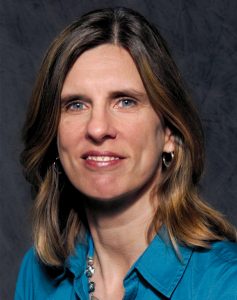 One of the first Rice University graduates with a bachelor’s degree in Computer Science, Mary Hall had no intention of staying on for a Ph.D. “I only wanted to write a masters thesis and do some research,” she said, “and I tried to quit twice, but each time Ken Kennedy talked me out of it.”
One of the first Rice University graduates with a bachelor’s degree in Computer Science, Mary Hall had no intention of staying on for a Ph.D. “I only wanted to write a masters thesis and do some research,” she said, “and I tried to quit twice, but each time Ken Kennedy talked me out of it.”
Hall began preparing for career as a computer scientist in an era when women composed 37% of all CS graduates nation-wide. “I started out as Computer Science and Managerial Studies, but switched to Computer Science and Mathematical Sciences (the precursor to CAAM) in my junior year,” she said. “I still recall looking around a room and realizing I was surrounded by men, so now I encourage women to pursue CS.”
She believes CS is a great career for women. “It pays well, it has lots and lots of flexibility, and there are so many things you can do with a CS degree.” Hall married and raised two daughters while developing her career during regular office hours.
“I dropped off the kids before work and left at 5:00 to pick them up again,” she said. “But if you want to have a flexible work life you can. There are too many stereotypes attached to CS– It’s not just a bunch of programmers. Generally speaking, CS careers tend to be flexible. A lot of people work from home, even telecommuting from different cities. Because it is a technology-oriented field, it gives you that flexibility, as long as you coordinate with the other people on your teams and projects.”
Hall, now a professor of computer science at the University of Utah, was not thinking about a flexible career when she double-majored in computer science and managerial studies at Rice. Her mother –a middle school math teacher– had an early interest in computers, took CS classes at their local university and got a Radio Shack TRS 80 home computer.
“I was exposed even before people really had computers in the home,” said Hall. “Then I took an aptitude test in high school and it indicated I was best suited for accounting or computer science so I pursued both at Rice.”
She performed well in her CS courses, but they did not capture her interest so she was planning to get an MBA after Rice. Hall said, “Then in my junior year, I took Ken Kennedy’s COMP 420 course on Algorithms. It was the first CS class I absolutely loved, both the subject matter and because Ken was such a great teacher. It completely changed my direction and I ended up deciding to pursue a masters in CS as a junior.”
In her senior year, she approached Kennedy about getting a masters degree in CS. Kennedy, the department chair, told her that she’d only be taking about 10 classes to broaden her knowledge. To go deep into research, she needed to pursue a Ph.D. and he offered her a stipend if she agreed to enter that program instead. “I didn’t really want the Ph.D.,” said Hall, “but I was a senior, broke, and the stipend sounded great. Plus, he said if I really wanted to quit later, he would help me figure out a way to get the masters degree.”
Twice during her program, Hall went to Kennedy to make good on that promise. “I’m quitting,” she told him. Each time, he convinced her to continue. Several decades later, Kennedy was talking with Hall, who had worked at Stanford, Caltech, and USC before settling into a tenured faculty role at the University of Utah. She said, “He looked at me and asked, ‘Remember when you wanted to quit and I talked you out of it?’ and I nodded. ‘I think you are doing all right,’ he said with a laugh, and I had to agree.”
Hall finds herself using some of Kennedy’s own strategies as she is teaching and mentoring students, including having them read from his textbook. She said, “I do a lot of things now that Ken did, even the way I talk to students sometimes. I catch myself and then have to laugh at myself.”
She is concerned about the significant drop in the percentage of women graduating with CS degrees between her era and today, but she is attuned to the challenges both women and minorities face as they contemplate CS careers.
“There are times when you doubt yourself,” she said. “We all have. Just remind yourself that you can do it and go find someone who will encourage you. I still need that. Everywhere I’ve worked, I built a network [of people like me] and we help each other.”
Hall talked about reaching into other groups or departments to find and build her network. “Sometimes you have to look a little farther. You look around and you are just surrounded by all these guys – or if you are minority – all these Caucasians and Asians –and you think, ‘no one understands me or what I’m going through’ and it is nice to find those people who you can talk to about that. You help each other.”
Mary Hall completed her B.A. in CS and MACS in 1985, and her Ph.D. in CS in 1991. Her adviser was Ken Kennedy.
